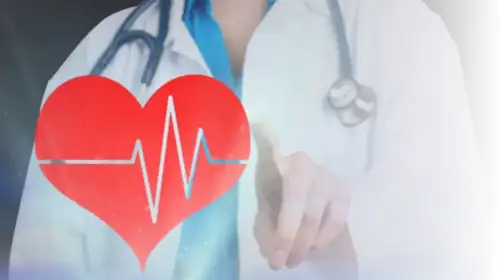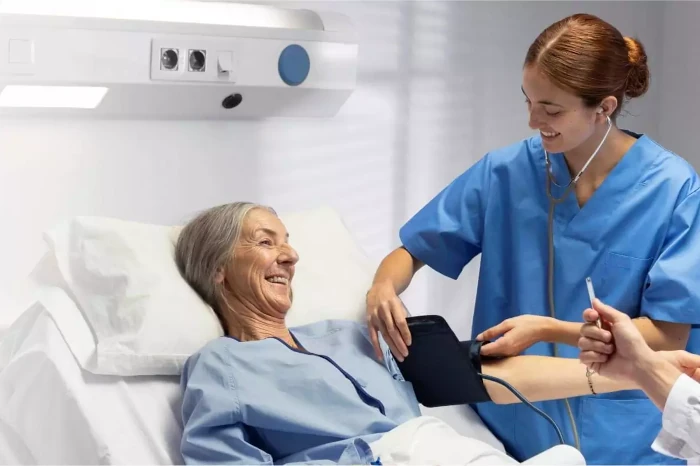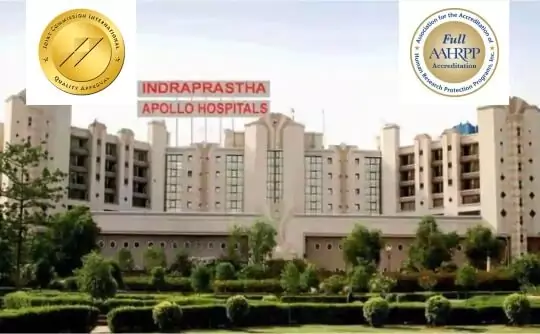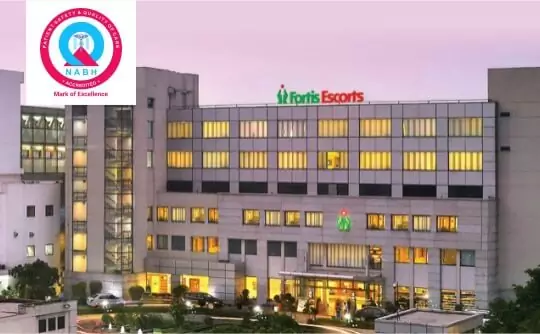

A substantial part of the total pacemaker cost in India comes from the type of pacemaker device chosen for the procedure. The specific pacemaker needed will depend on your medical condition and heart's functionality, which our doctors will determine after thoroughly evaluating your medical reports or conducting an in-person examination.
Depending on the assessment, you may require either a single-chamber pacemaker or a more advanced dual-chamber or biventricular pacemaker, based on the severity of the heart's electrical issues and rhythm disturbances.
A significant component of a pacemaker cost in India is the heart surgeon's fees. IndiCure recommends highly experienced, skilled, board-certified heart surgeons who have the track record of delivering excellent results. While the charges may vary based on the surgeon's experience, you can be confident that you are in safe and capable hands when opting for affordable heart surgery in India with IndiCure Health Tours.
Selecting an accredited medical facility with skilled and qualified medical staff is essential for the success of pacemaker implantation surgery in India. Larger cities in India generally provide superior medical facilities and more experienced heart surgeons, leading to higher costs. IndiCure Health Tours recommends surgical facilities in these larger cities to prioritize quality of care and ensure patient safety.
The expenses related to pacemaker implantation include the pre- and post-surgical expenses. The pre-surgical expenses are associated with the age and medical condition of the patient and thus the number and type of investigations required. Post-surgical expenses include prescription medications and follow-up consultations.
At IndiCure Health Tours, we consolidate most of the expenses for your pacemaker cost in India to provide you with an inclusive and cost-effective package tailored to your budget and individual requirements. After receiving medical reports, your case manager will provide an estimated cost based on a discussion with the heart surgeon.
The final pacemaker cost in India can however be confirmed after your face-to-face consultation with the heart surgeon in India.

We Help you Choose the Right Treatment, Surgeon & Hospital

We Arrange Video/Telephonic Consultation with the Surgeon

We Assist you with Visa & Accommodation

We Receive you at the Airport and Drop you at Hotel/Hospital

We Assist you the at Hospital & Provide Post Operative Support
IndiCure Health Tours enables exclusive savings on your medical travel to India. We choose to partner with top hospitals in India to negotiate special rates, ensuring you get the best possible price on your healthcare when you plan your medical travel with us.

Here is a set of questions you should consider asking before commencing your medical trip for Pacemaker Implantation surgery in India.
Prepare to answer questions about your:
The heart has a conduction system that transmits electrical impulses to keep the heart muscles in appropriate rhythm. These electrical impulses are generated in the right atrium by specific Sino Atrial tissues (S A nodes), and subsequently spread throughout the upper chambers. The Atrioventricular node, which connects the auricles and ventricles, distributes the impulses. Another group of tissues known as the Bundle of Hiss is in charge of electrical conduction, which causes the ventricles to contract and pump blood to the body and lungs. These three together make up the heart's natural pacemakers.
Arrhythmia is a disease that occurs when electrical impulses in the heart are interrupted.
Brady arrhythmias occur when the heart beats too slowly. Heart block or sinus bradycardia can be the cause. Sinus bradycardia is caused by the natural pacemakers slowing down. A block or delay in the conduction of electrical impulses in the heart causes heart block. Heart blocks come in a variety of degrees and types, such as 1st-degree AV block and 2nd-degree AV block.
Tachyarrhythmias occur when the heart beats too quickly. Pacemakers are used to treat ventricular tachycardia and atrial fibrillation, two forms of tachycardia. Ventricular tachycardia is caused by fast contractions in the ventricles, which can result in cardiac collapse. Atrial fibrillation is a condition in which the atria fail to pump blood into the ventricles.
Arrhythmias can cause the following symptoms:
The following are the causes of cardiac arrhythmias:
A pacemaker is a surgically implanted device that sends tiny electrical impulses to the heart muscles to maintain or restore normal heart rate in cases of slow or unpredictable heartbeat. Brady-arrhythmia is the most common reason for pacemaker implantation; however, the decision is made based on the source of the arrhythmia, the severity and permanence of the condition, symptoms, and the patient's risks.
The artificial pacemaker consists of the following components:
A pulse generator comprises a thin metal box that produces the electrical impulses and a computer processor to set the rate, pattern, output, and other parameters.
Leads to carrying electrical impulses to the heart muscles from the generator.
Electrodes at the ends of leads transmit electrical impulses to the heart muscles.
To help manage your heartbeat, a pacemaker is inserted. When you have a slow heartbeat (bradycardia) after a heart attack, surgery, or medication overdose but your heartbeat is predicted to recover, your doctor may consider a temporary pacemaker. A pacemaker can be permanently placed to treat heart failure or to rectify a chronic slow or irregular heartbeat.
Pacemakers are classified as:
Single-chamber pacemakers: These carry impulses of either the right atrium or right ventricle.
Dual-chamber pacemaker: This has two leads, to the right atrium and right ventricle so that a more natural approach of the heart activity is obtained.
Triple-chambered pacemaker: This leads to the right atrium, the right ventricle, and left ventricle. It is used in cases when the heart muscles are weak.
Biventricular Pacemaker: commonly known as cardiac resynchronization therapy, is a treatment for people with heart failure and irregular heartbeats. The right and left ventricles (lower heart chambers) are stimulated by this type of pacemaker, which causes the heart to beat more efficiently.
There are different types of pacemakers to restore or maintain a regular heartbeat:
Pacemaker implantation procedure is done by specially trained cardiologists or electrophysiologists who are experienced to perform such procedures. It can be done under local or general anesthesia. Fluoroscopy is used for imaging of the procedure. The type of device decides the length of the surgery.
The surgeon inserts a needle into a large vein near one of the shoulders to guide the wires of the pacemaker and correctly place them in the heart.
The procedure is guided by an X-ray "movie". After successfully placing the wires, the surgeon makes a small cut into the skin of the chest or abdomen and inserts the pacemaker just under the skin.
The pacemaker is connected to leads or wires that are threaded through veins into specific chambers of the heart. Once in place, the device is tested to make sure it works properly.
Recovery after pacemaker implantation is rapid, but arm movement and activity restrictions are advised for the first few weeks. The hospital stay is short, a day or two after the surgery. Routine activities can be resumed in about two weeks.
Properly implanted pacemakers resolve arrhythmias and other symptoms of abnormal heart rate. Pacemaker usually lasts up to 10-15 years on average. It can be replaced after that time.

New Delhi
Indraprastha Apollo Hospitals, New Delhi is a state of the art multi speciality tertiary-care hospital situated in the most posh area of South Delhi. Considered to be the flagship hospital of Apollo group, Indraprastha Apollo Hospital is one of the important landmarks not only in Delhi, but in the world map because of its popularity among the medical tourists. The hospital has been one of the most sought after medical institutions for patients from Asia Pacific and beyond.

New Delhi
Fortis Escorts Heart Institute and Research Centre is one of the most revered medical institutions not only in India, but the entire world. The institute has set benchmarks in cardiac care with path-breaking work over the last 25 plus years. The hospital has the most advanced technology and has seen the best outcomes even in the most complex cardiac cases; be it cardiac surgery, Interventional Cardiology, Pediatric Cardiology, Pediatric Cardiac Surgery or Non-invasive Cardiology
After around four weeks, you should be able to do all you desire. The amount of time you'll require off work will be determined by your employment. Your cardiologist should be able to help you with this. People who have had a pacemaker implanted are typically recommended to take 3 to 7 days off work.
Avoid vigorous activity, particularly lifting and other upper-body tasks. This permits the lead(s) to firmly adhere to your heart tissue while also allowing the incision to heal.
The procedure normally takes about an hour, but it could take longer if you're also getting a biventricular pacemaker with three leads or additional cardiac surgery. After the procedure, you'll normally have to stay in the hospital for 1-2 days.
It is advisable to sleep on the right side after you have had a pacemaker implanted (pacemakers are usually implanted on the left side). Having said that, if you are used to sleeping on the left side, you can surely do that. You will not harm your device even if you sleep on the left side.
High-fat foods, such as red meat, cheese, and baked products, should be avoided. Reduce the amount of harmful fats, such as saturated and trans fats, in your diet, like butter and shortening- fats that are more likely to be solid at room temperature. Substitute monounsaturated and polyunsaturated fats for saturated fats.
You may find a firm ridge running the length of the incision. In the months following surgery, this generally softens. The contour of the pacemaker may be visible or felt beneath your skin.
According to surveys, 80% of pacemakers are placed in the elderly, and pacemaker beneficiaries are now on average 75 years old.
A pacemaker can typically eliminate the symptoms of bradycardia by regulating the heart's rhythm. Individuals often have greater energy and experience less shortness of breath after pacemaker implantation.
Patients who have had an ICD implanted for primary prevention should refrain from driving a private vehicle for one week to allow for device recovery. Patients who receive ICDs for secondary prevention should not drive for six months.
Yes, the pacemaker resolves arrhythmias and other symptoms of abnormal heart rate and helps you lead a normal life.
People who have atrial fibrillation, a type of irregular heart rhythm, are usually prescribed strong blood thinners to prevent strokes. However, some patients with pacemakers or defibrillators may not require the drugs all of the time.
Yes, it is generally safe for patients aged 70 to 75 to undergo coronary artery bypass surgery. As coronary artery disease is more common in older adults, many patients in this age group benefit from the surgery to improve heart function and quality of life. Advances in minimally invasive techniques have made the procedure safer, even for elderly individuals, with reduced recovery times and lower risks of complications.
In addition to the actual surgery cost for having pacemaker in India, there are several other expenses you should plan for when organizing your trip. These include:
Meals during your hospital stay are covered in your surgery cost. So, you need to budget for expenses for meals before and after the hospital stay.
Airfare from your location to the city in India where you will be having surgery. This may vary depending on your departure location and the time of booking.
You will spend on taxi fares, ride-sharing services, or rental cars for travelling between the hospital and hotel.
Lodging will be required before you get admitted at the hospital and after you get discharged from the hospital. It's cost may vary depending on proximity to the medical facility and the level of luxury you choose for yourself.
By accounting for these additional expenses along with the surgery cost of having Pacemaker in India, you can create a comprehensive budget to ensure a smooth, hassle-free and comfortable recovery experience.
Enhance your medical journey to India by availing these extra services.
Traveling abroad for medical reasons may be challenging. With our experience of over a decade and working with the best surgeons and top hospitals in India, we help make your medical tour easier and safer for you. We will guide you at every step of the way and make end-to-end arrangements for your surgery, travel, and stay.
Ramandeep Dhaliwal
I had great experience having rhinoplasty through Indicure. Dr. Ruchika from Indicure has helped me in finding best plastic surgeon, answering all my questions...
Read More
Joshua Archer
My name is Joshua Archer I'm from New Zealand, bay of plenty, kawerau I opted for the bypass surgery in January 2023 but planned it in advance for 28 September found IndiCure...
Read More
Kera Ren
Absolutely loved my experience with IndiCure - from first inquiring to meeting the surgeon pre op to my follow up post op. The surgeon was extremely approachable...
Read More
Andreana Paul
Had a wonderful experience. Visited India for my plastic surgery. From sending mails, airport pickup, comfortable accommodation and, to smooth hospital appointment booking...
Read More
Brandi Luce
I had the privilege of using Indicure's services for a cosmetic procedure that I had wanted for a long time but had always been apprehensive about. Ruchika helped me...
Read More
Jade M
Indicure Health Tours went above and beyond my expectations. They helped me with every aspect of my journey and were professional, kind and caring. I was...
Read More
The content on the website (www.indicure.com) is intended to be general information and is provided only as a service. All photographs on our website of before and after results are examples only, and do not constitute an implied or any other kind of certainty for the result of surgery.
Learn about IndiCure Health Tours' comprehensive editorial policy that strives to deliver trustworthy, helpful, relevant, accurate and people-first content on medical tourism in India.
It is not medical advice and should not be taken as medical advice. It should not be used to diagnose or treat a health condition and is in no way meant to be a substitute for professional medical care. You are advised to see a surgeon in person to assess what surgery may or may not accomplish for you.
It is also important to keep your expectations realistic and to understand that all surgical procedures carry risks and should never be taken lightly.